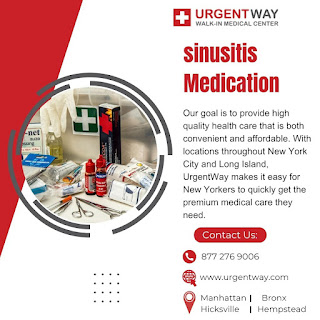Are there any recent advancements in sinusitis medicine that offer improved efficacy and faster relief?
Are there any recent advancements in sinusitis medicine that offer improved efficacy and faster relief?
Introduction:
Millions of
people worldwide suffer from sinusitis, a common ailment that has long caused
pain and inconvenience. Medical rese
arch has been driven by the need for
effective therapies, and new advancements hold the prospect of greater efficacy
and quicker alleviation. This post will examine the revolutionary advancements
in sinusitis treatment, including novel treatments, drugs, and methods that are
changing the face of sinusitis care.
Knowing About Sinusitis:
Before
discussing current developments, let's take a quick look at sinusitis. The
sinuses, which are empty spaces inside the bones that surround the nose, became
inflamed and infected, resulting in this inflammatory illness. Frequent
manifestations comprise of facial pain, congestion, headaches, and dyspnea, all
of which have a substantial effect on an individual's quality of life.
Conventional Methods of Treating
Sinusitis:
In the past,
nasal corticosteroids, decongestants, and antibiotics were used in conjunction
to treat sinusitis and fight bacterial infections. Although many have found
success with these methods, there is an increasing demand for more focused and
efficient solutions.
Latest Progress:
Precision Medicine for Sinusitis: New developments in molecular
medicine have made it possible to treat sinusitis with a more individualized
approach. Precision medicine allows for more effective targeted therapy by
customizing interventions according to a person's genetic composition. In order
to develop individualized therapy regimens that target the underlying causes of
sinusitis, researchers are currently examining genetic markers linked to
vulnerability to the ailment.
Biosimilars for Sinusitis: Biosimilars are a new class of drugs
that come from living cells and are used to treat a variety of inflammatory
diseases. Biologics, like monoclonal antibodies, are used to treat sinusitis by
targeting immune system pathways that are linked to inflammation of the
sinuses. This focused strategy provides patients with chronic sinusitis with
quick relief while minimizing adverse effects that are frequently linked to
standard drugs.
Innovations in Nasal Irrigation: For the treatment of sinusitis,
nasal irrigation—which is flushing the nasal passages with saline solution—has
long been advised. Technological developments in this field have led to the
creation of sophisticated irrigation systems that administer salinity more
effectively and under control. Some devices optimize the efficiency of nasal
irrigation for patients with sinusitis by including features like pulsatile
irrigation and temperature control.
Antibiotic Substitutes: The proliferation of bacterial
strains resistant to antibiotics is partly due to the abuse of antibiotics.
Alternative antimicrobial agents, like probiotics and antimicrobial peptides,
are being investigated by researchers as possible sinusitis therapies. With the
goal of avoiding infections without encouraging antibiotic resistance, these
cutting-edge methods seek to preserve a balanced population of bacteria in the
sinuses.
Novel Approaches to Drug
Administration:
Improved
sustained release and bioavailability of intranasal formulations are the result
of advancements in drug delivery technologies. These formulations guarantee a
longer-acting and more focused drug action inside the sinuses, which lowers the
frequency of administration and improves treatment efficacy overall.
Immunotherapy for Sinusitis: Currently being investigated as a
possible treatment for sinusitis, immunotherapy is frequently used to treat
allergies. Immunotherapy seeks to lessen inflammation and ease the symptoms of
sinusitis by adjusting the immune system's reaction to allergens and irritants.
This method provides a long-term remedy for people whose sinusitis is brought
on by allergens.
Advanced Imaging Techniques: Customizing the course of treatment
for sinusitis depends heavily on diagnostic developments. Cone-beam computed
tomography (CBCT) and magnetic resonance imaging (MRI), two high-resolution
imaging modalities, offer precise views of the sinuses to help with diagnosis
and treatment planning. With the use of these sophisticated imaging
technologies, medical practitioners can pinpoint particular anatomical problems
that contribute to sinusitis and adjust the course of treatment accordingly.
Sinus Infection Doctor on UrgentWay
Walk:
All
UrgentWay clinics provide treatment for sinus infections treatment. We are open seven
days a week, from morning to evening, so you can visit whenever it is
convenient for you. Our skilled providers will evaluate your situation,
recommend the best sinus infection therapy, and advise you on prevention
measures.
The
infections range in severity, and in some cases, intensive treatment is
required. However, in most situations, pain relievers such as nasal
decongestants and nonsteroidal anti-inflammatory drugs are sufficient.
Antibiotics may also be needed to treat the sinus infection.
If you are
experiencing uncomfortable sinusitis symptoms and require immediate treatment,
visit UrgentWay in New York to see our sinus infection expert.
Conclusion:
The field of
sinusitis treatment is continuously changing, with new advances providing unparalleled
promise for those seeking increased efficacy and speedier relief. Researchers
and healthcare professionals are studying a wide range of treatments to address
the complexity of sinusitis, including precision medicine, biologics, new drug
delivery systems, and immunotherapy.
As new
advances continue to emerge, the future of sinusitis therapy appears bright,
with the potential to transform how we manage and alleviate the symptoms of
this prevalent but frequently debilitating ailment. It is critical for patients
and healthcare providers to be updated about these discoveries, promoting a
collaborative effort to ensure that people with sinusitis have access to the
most effective and personalized therapies possible.
.jpg)



Comments
Post a Comment